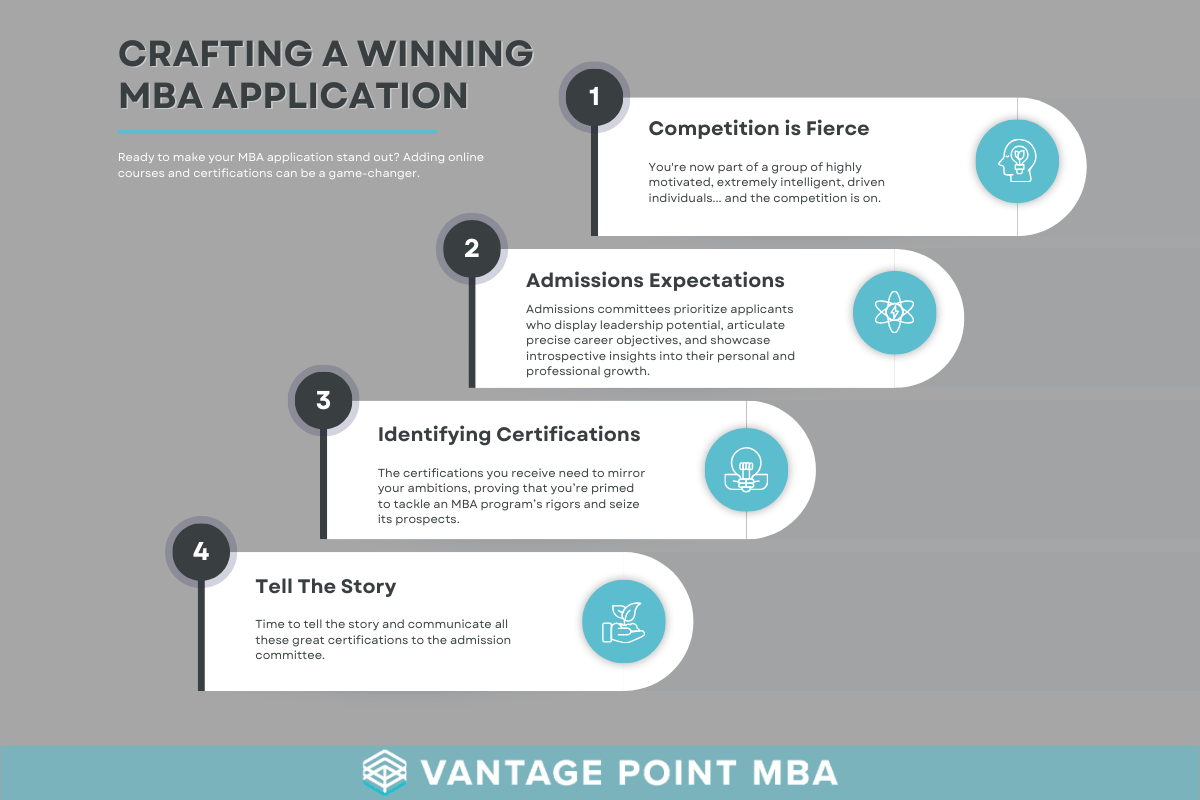Leveraging Online Courses and Certifications to Strengthen Your MBA Application

You’ve spent months preparing for this moment. This is the culmination of countless hours of hard work. Soon enough, you will be hitting the submit button on your business school applications. And then the waiting game begins.
But first, let’s talk about one of the steps leading up to the moment you click submit. What can you do to increase your chances of receiving that acceptance letter?
Consider strengthening your MBA applications by leveraging additional courses and certifications.
We frequently recommend additional coursework for applicants with low GPA or test scores. However, certifications like the CFA can also enhance profiles for candidates in other situations. Absolutely! So, let’s dive into why these credentials could be beneficial and how they can showcase your drive for self-improvement and commitment to the MBA application process.
Key Takeaways
-
Take every opportunity to stand out. Online courses and certifications can enhance an MBA application by demonstrating a candidate’s commitment to continual learning and self-improvement, especially in areas that may not be covered by their undergraduate degree or work experience.
-
Choose the right course(s) for you. When selecting online courses, select courses aligned with your post-MBA career goals. Prioritize accredited programs led by industry-recognized instructors.
-
It’s not just what you’ve done, it’s how you tell the story. Applicants should effectively incorporate their supplemental coursework into their MBA applications by detailing in their essays and online application forms how the courses have expanded their business acumen and provided an offsetting data point for academic or work experience weaknesses.
Crafting a Winning MBA Application: A Step-by-Step Guide

Let’s first address why you should consider putting in the extra work to pursue an additional course or professional certification. Simply put, the competition is… fierce. The best of the best apply to the top 10 business schools every year. And you’re now part of that group of highly motivated, extremely intelligent, driven individuals… and the competition is on.
In such an intense and competitive environment, putting your best foot forward is key. By leaving nothing to question and proactively addressing your weaknesses, you increase the chances that your application will capture the admissions committee’s interest.
As such, taking an online course or certification demonstrates your motivation to learn as well as self-awareness and initiative. And this can set you apart from other equally qualified applicants.
Understanding Admissions Committee Expectations

Admissions committees read thousands of applications every year. They interview the best and brightest and hand-pick the few they believe should attend their school.
So it’s helpful to understand how they think and what they’re looking for.
Admissions committees prioritize applicants who display leadership potential, articulate precise career objectives, and showcase introspective insights into their personal and professional growth.
These attributes indicate a candidate’s readiness for the demanding yet transformative experience that an MBA program offers.
That said, admissions committees don’t expect you to be perfect. After all, if you were perfect, you would have no need for an MBA. But they do expect you to have a solid grasp on your shortcomings and to show proactive measures for addressing them. Said another way, they’re looking for simple yet impactful evidence that you don’t present any red flags for their program.
Now that you understand your audience (the admissions committee), you’ll have a better chance of crafting an application that will be considered.
Why Online Courses and Certifications Matter

Not every applicant requires additional coursework. However, pursuing online courses and certifications can visibly showcase your dedication to personal growth and a keen interest in gaining knowledge. It puts your dedication front and center on the application.
These educational pursuits also strengthen parts of your profile that may be lacking, offering concrete support to the story you present in your applications and reassurance of your ability to handle the rigor of the MBA curriculum at a top-tier institution.
This isn’t only critical for applicants with weaknesses such as a lower GPA or an undergraduate degree obtained from an institution that isn’t widely recognized. It could be equally important for applicants with academic (i.e. English, History, Psychology, Music, etc.) or professional (i.e. military, law, non-profit, arts, etc.) backgrounds outside of business.
Identifying Relevant Courses and Certifications

Now that you understand why additional courses and certifications are so important, let’s talk about which ones may help you stand out.
-
Check to see if your school of choice offers certifications. If there are certifications that meet your criteria, are within your budget, and can be done in time, consider signing up. If you’re already applying in two months or less, then this step may be too late. However, if you have a few months before your deadline, it could be a worthwhile endeavor. (Example: HBS Online CORe).
-
Core skills in areas like finance, marketing, and management are fundamental. If you don’t have a business-adjacent undergraduate degree or relevant work experience, pursuing courses in those subjects will make your applications more competitive. (Example: MBAMath or Business Foundations Specialization).
-
Proficiency in emerging domains like artificial intelligence, data analytics, and sustainable business practices can set you apart. If your career goals center around one of these domains and you lack relevant experience, taking a course can help bridge the gap and give your story credibility.
- Lastly, passing the CFA or earning other professional certifications such your PMP can demonstrate your commitment to the field, advanced knowledge, and/or analytical skills.
No matter what certification(s) you choose, they should mirror your ambitions, proving that you’re primed to tackle an MBA program’s rigors and achieve your career goals.
When selecting courses, evaluate the substance of what is being taught as well as the qualifications and reputation of the instructors.
Note: Make sure that your chosen MBA programs acknowledge and value these courses!
When in doubt, it never hurts to reach out to your school’s admissions offices and confirm that they are familiar with the course and what it takes to complete it. A quick phone call can make all the difference.
Top Platforms for Online Learning

The internet is filled with platforms offering a wide variety of courses to help you develop both personally and professionally. Here are some to consider:
-
Coursera and edX are distinguished by their collaborations with prestigious universities, such as UPENN Wharton. This gives you access to top-tier education at your fingertips.
-
Udemy boasts an extensive collection that appeals to various learners because it is cost-effective without drastically affecting the course quality.
-
LinkedIn Learning focuses specifically on enhancing career-related abilities, offering training in skills that can be directly applied within the workplace environment.
-
As mentioned above, call your school of choice and ask if there are online courses and certifications available to anyone directly. Our clients have successfully taken courses through UC Berkeley Extension and UNC-Chapel Hill Digital and Lifelong Learning, to name a few.
Incorporating Courses into Your MBA Application

Once you’ve completed your supplemental course or certification, it’s time to incorporate it in your applications, namely your essays and application form short-answers.
-
Start by clearly articulating how your online courses have deepened your understanding of business theories and practices in your optional essay. Detail the specific skills you have gained, such as strategic planning, financial analysis, or digital marketing, and how they are directly applicable to your professional aspirations.
-
Reflect on specific instances where the insights you gained from your courses have influenced your approach to solving business challenges or contributing to team goals.
-
Mention any notable projects or assignments that demonstrate your ability to apply theoretical knowledge to practical scenarios.
-
Describe how the flexibility and diverse perspectives of e-learning have enriched your understanding of complex business concepts and broadened your global outlook.
-
In the online application forms, describe your e-learning experiences in detail, outlining the content covered and any graded assignments and/or final grades. Explain how these courses have not only equipped you with technical knowledge but also fostered skills like time management, self-discipline, and adaptability.
Demonstrating a clear connection between your online learning and your professional growth can profoundly affect the admissions panel’s perception, positioning you as a well-rounded and proactive candidate ready to excel in their program.
Tips for Balancing Online Courses with Other Commitments

Balancing online courses with work, family, friends, and personal responsibilities might initially seem overwhelming, but it’s entirely achievable with effective time management and a disciplined approach.
-
One of the first steps is to create a realistic and flexible schedule that accommodates all your commitments. Use tools like digital calendars or planners to allocate specific times for studying, work, and personal activities, ensuring that none of these areas are neglected.
-
Breaking down your coursework into manageable tasks and setting short-term goals can help maintain your focus and reduce stress. Prioritize your tasks by deadlines and importance, and try to complete them in smaller, consistent increments rather than cramming at the last minute.
-
Incorporating regular breaks and down time into your schedule is also crucial, as it helps maintain your mental health and keeps you motivated.
-
Motivation plays a pivotal role in balancing online learning with other aspects of your life. It’s essential to keep your end goal in sight, whether it’s career advancement, personal growth, or acquiring new skills.
-
Surround yourself with a supportive network of friends, family, or fellow students who understand your commitments and can offer encouragement. Staying engaged with the course material by actively participating in discussions, seeking help when needed, and applying what you learn to real-world situations can also enhance your motivation and make the learning process more enjoyable.
-
Additionally, leveraging online resources and tools provided by the course can help you stay organized and on track.
Deep breath! Honing your skills of time management and prioritization will make a huge difference in all aspects of your life in the future.
Achieve MBA Success: Expert Guidance and Personalized Strategies with Vantage Point MBA Consultants

Applying to business school can be daunting. But with a Vantage Point MBA admissions consultant, you gain a collaborator who is deeply committed to your success. Everyone on our team has one goal: to get you into the MBA program of your dreams.
As MBA admissions experts, we draw upon our extensive experience as we steer our clients through the application process by providing personalized strategies that highlight each individual’s unique capabilities and address areas for improvement.
Our services are all-inclusive. We collaborate closely with you to sharpen your career goals, craft a compelling application narrative, and prepare you to nail your interview—allowing you to showcase your best self to the MBA admissions committee.
Lastly, our methodology incorporates elements of risk management to help you foresee and overcome any hurdles or uncertainties that may arise throughout your application process.
When to Get Started

Starting online courses and certifications that will help you get into a top business school should be strategically timed and well-planned. Here are some guidelines to consider:
During Early Career
-
1-2 Years After Graduation: Gain relevant work experience and start certifications that are directly related to your field. Certifications like the CFA (Chartered Financial Analyst), PMP (Project Management Professional), or specific technical skills (e.g., data analysis, digital marketing) can be beneficial.
-
Mid-Level Career: If you’re planning to apply to business school later in your career, target certifications that demonstrate leadership and advanced skills in your industry.
Preparation for Business School Application
-
1 Year Before Applying: Focus on certifications that align with your career goals and the curriculum of your target business schools. For example, if you’re interested in finance, certifications like the CFA or FRM (Financial Risk Manager) are valuable.
-
6-12 Months Before Application Deadline: Ensure you complete any remaining certifications and gather the final certificates / transcripts.
Full Summary
Strategically selecting and completing online courses and certifications can significantly enhance your MBA application for top-tier business schools.
-
Research Requirements: Investigate the specific requirements and preferences of your target schools. Some schools may value certain certifications more highly than others.
-
Balance with Experience: While certifications are important, remember that work experience, leadership roles, and extracurricular involvement matter more. So balance your time between gaining practical experience and completing certifications.
-
Focus on Quality: Select well-recognized and respected certifications that provide credible knowledge and skills. Quality over quantity is crucial.
-
Network: Engage with professional networks and alumni from your target schools. This can provide insights into valuable certifications and other preparatory steps.
With the right strategy, additional courses showcase the applicant’s dedication to ongoing education, align with their career objectives, and portray a candidate who is both thoroughly prepared for an MBA and their career afterwards.
Frequently Asked Questions
How can online courses and certifications strengthen my MBA application?
Online certifications strengthen MBA applications. They signal a clear commitment to continuous learning. These programs help bridge any gaps in your academic or professional experience while also highlighting your proactive nature and self-awareness.
Including certifications from online courses in your MBA applications can differentiate you from other candidates as well.
What kind of online courses should I choose for my MBA application?
It is important to select online courses that not only support your career aspirations but also relate to the content of an MBA education. Programs should cover essential business fundamentals and introduce you to cutting-edge areas of specialization.
Are there any specific online learning platforms you recommend?
First, check to see if your school of choice offers any certifications. HBS Online CORe is very popular. Leverage online learning platforms such as MBAMath, Coursera, edX, Udemy, and LinkedIn Learning to access a diverse selection of courses that could bolster your MBA application.
How do I effectively incorporate my online coursework into my MBA application?
When applying for an MBA, make sure to weave your online coursework into the narrative of your application. In your essays and application form short-answers, delve into how it has enhanced your grasp of business concepts and illustrate how you’ve practically applied these acquired skills.
Showcasing continuous learning through online courses can be an attractive quality to potential employers and MBA programs, indicating a strong desire for self-improvement.
Can a Vantage Point MBA admissions consultant really make a difference in my MBA application process?
Absolutely! Admissions consultants at Vantage Point MBA offer tailored services to enhance your application and maximize your chances of acceptance.





Pingback: Applying to Business School in Round 3 | Vantage Point MBA
January 9, 2025 5:23 pmPingback: Decoding Your Undergraduate Transcript for MBA Admissions - Vantage Point MBA
April 9, 2025 2:38 pm